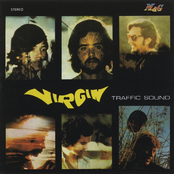Virgin

Biography
Traffic Sound was a psychedelic and prog rock band from Lima Peru, founded in 1967 by Manuel Sanguinetti (vocals), Freddy Rizo Patrón (rhythm guitar), Jean Pierre Magnet (sax), Willy Barclay (Willy "Wilito" Barclay) (lead guitar), Willy Thorne (bass) and Luis Nevares (Luis "Lucho" Nevares) (drums). Freddy and Manuel had met in school and played in Los Hang Ten's. Freddy and his older brother Jose originally thought of founding "Traffic Sound". The name was chosen because of their penchant for...
Traffic Sound was a psychedelic and prog rock band from Lima Peru, founded in 1967 by Manuel Sanguinetti (vocals), Freddy Rizo Patrón (rhythm guitar), Jean Pierre Magnet (sax), Willy Barclay (Willy "Wilito" Barclay) (lead guitar), Willy Thorne (bass) and Luis Nevares (Luis "Lucho" Nevares) (drums).
Freddy and Manuel had met in school and played in Los Hang Ten's. Freddy and his older brother Jose originally thought of founding "Traffic Sound".
The name was chosen because of their penchant for a traffic light, placed as a souvenir in the attic of the Rizo-Patróns house, where they held their practices, after a wild night in Lima.
After a year of continued rehearsals and private shows they tried their luck at Peruvian psychedelic emporium The Tiffany with great success and recorded his first album "A Bailar Go Go" in 1968 with label MAG. It contained versions of songs by The Doors, Cream, Jimi Hendrix, Iron Butterfly and The Animals. In later albums they included their own music with a fusion of Andean and Afro-Latin sounds. They held gigs in Peru, Chile, Argentina and Brazil.
Their second album "Virgin" (1969), all original material, catapulted them to legendary status especially because it contains the absolute icon of Peruvian Psychedelia, "Meshkalina".
In 1970 they recorded another LP named "Traffic Sound", aka. III, aka. "Tibet's Suzettes", where they blend the Psychedelic spirit with an Andean folk sound, and give the necessary step to be closer than ever to progressive rock.
In 1971 Braniff International Airways organized the first South American Tour of a Peruvian band, and Traffic Sound was well received in demanding markets such as Argentina and Brazil.
After the tour they switched to bigger label Sono Radio and released four singles. At this point Willy Thorne left the band and was replaced by Zulu or (Miguel Angel Ruiz Orbegoso) on bass, with whom they recorded their last LP, "Lux". Incredibly, during a massive strike of Sono Radio workers the master tapes disappeared and were only found in 1996. This album is different to the previous, the Andean influence is more evident and some political concerns were expressed.
The band held a memorable concert at the Teatro Segura in Lima together with the Contemporary Orchestra of Peruvian jazz pianist Jaime Delgado Aparicio in 1971 and disbanded in 1972.
A popular Peruvian rock group in the late 1960s and early 1970s, Traffic Sound had a very British-influenced early progressive rock sound along the lines of Traffic and (more distantly) Jethro Tull. These similarities were evident in the band's use of flute and saxes, all played by Jean Pierre Magnet, who could also play vibes and percussion. What is surprising is that Traffic Sound, unlike other South American groups of the period that only came to light in the Northern Hemisphere in the 1990s, do not sound exotic or primitive. They simply sound like an accomplished minor-league 1970 rock band with considerable progressive, psychedelic, and soul influences informing their original material. There's a Latin feel to some of the rhythmic percussive grooves, sure, but no more, really, than you would find in a cut like Traffic's "Feelin' Alright." They disbanded in 1972 after four albums; some of their material found US release in 1997.
Read more on Last.fm. User-contributed text is available under the Creative Commons By-SA License; additional terms may apply.

